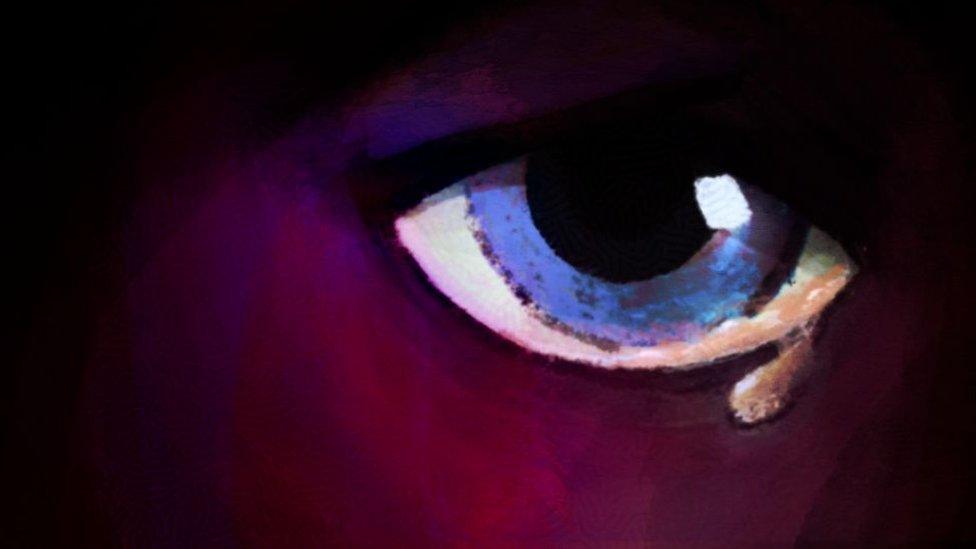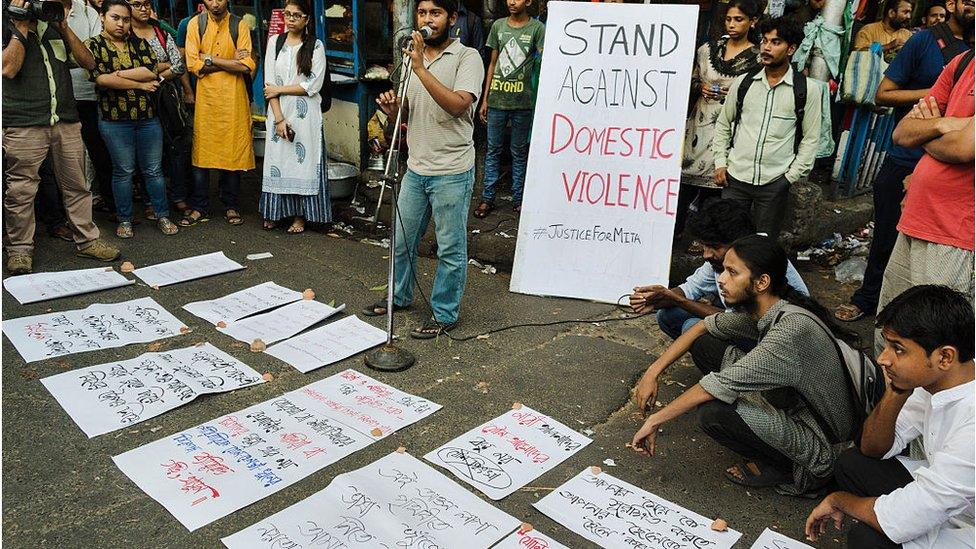What India's lockdown did to domestic abuse victims
- Published

Like in many other countries across the world, India's prolonged coronavirus lockdown has proved to be especially difficult for victims of domestic abuse. BBC Telugu’s Padma Meenakshi reports.
On 18 April, Tara - whose name has been changed on request - went online to search for helplines for survivors of domestic violence.
It was a little more than three weeks into India’s lockdown, which began on 25 March.
Her husband of 15 years had always been abusive - verbally, emotionally and, at times, even physically. But she had her job, which kept her out of the house for most of the day, and her husband often travelled for work, which kept him away.
The lockdown, however, changed everything.
“I live in a constant state of fear - of what could affect my husband’s mood,” she told me, speaking over the phone in a low voice after locking herself up in a room so her husband and mother-in-law wouldn’t hear her.
She says both of them taunt and harass her. “I am constantly told I am not a good mother or a good wife. They order me to serve elaborate meals, and treat me like a domestic worker.”

Over the years, more and more women are speaking out about violence at home
Unable to bear the abuse and the beatings, she decided to seek help. She found a Facebook page run by Invisible Scars, a support group, and contacted them.
“We have been receiving numerous complaints, seeking help,” says Ekta Viiveck Varma, founder of Invisible Scars, who spoke to Tara.
She says she laid out all the options available to Tara - register a police complaint, seek legal separation, or even talk her husband into going for counselling.
Tara says she warned her husband she would go to the police, and the abuse stopped for a few days, but started again. Leaving, she says, is not an option.
“Only God can save me,” she adds. “I can’t trouble my parents and my young child.”
A spike in complaints
“Most of the time, women don’t want to leave an abusive spouse - they ask us how to teach them a lesson or make them behave better,” Ms Varma says.
That’s because of the stigma attached to divorce in India - few families would support daughters who want to walk out of abusive marriages, especially if they have children, as Tara does. And leaving to go stay in a shelter or with parents is especially hard during the lockdown when transport has been limited.
"Cruelty by Husband or His Relatives" accounted for 32% - nearly a third - of all crimes against women registered by the police in 2018, the last year for which data is available.

Calls to crisis helplines have increased across the world
Police registered 103,272 such cases in 2018.
According to India's national family health survey - an exhaustive household government survey - from 2015-16, around 33% of women have experienced spousal violence - physical, sexual or emotional.
It adds that just 14 % of women who experienced violence have sought help to stop it.
Even then, the National Commission for Women has seen a spike in the complaints it receives, its chairperson, Rekha Sharma, told the BBC. So much so that it launched a WhatsApp helpline for women during the lockdown - the messaging app is widely used in India, and is a safe option for those who cannot make calls for fear of being overheard.
Between 23 March and 16 April 2020 - roughly the first three weeks of the lockdown - the commission received 239 complaints of domestic violence. This was a significant jump from the 123 complaints it received in the month leading up to the lockdown.
“The abuser feels frustrated and angry because of lack of control due to the constraints imposed by lockdown,” says Ashwini Deshpande, an economist and a professor at Delhi’s Ashoka university.
“This prompts him to exercise greater control by abusing his partner and/or children, often with violence.”
Ms Deshpande has compared the complaints received by the commission in March and April 2020 with those recorded for the same period in 2019. And she found that while they would receive five complaints on average every day last year, this time it was nine complaints on average daily.
This isn’t unique to India - early in April, UN Secretary General Antonio Guterres said there was a “horrifying global surge in domestic violence” , externalamid lockdowns. The calls to helplines doubled in Lebanon and Malaysia, and tripled in China, compared with the same time last year, according to the UN.
“In a country like India, it’s not easy for women to come out and report,” says Nayreen Daruwalla of Sneha, a non-profit that runs a crisis helpline for survivors of domestic violence.
Allow Instagram content?
This article contains content provided by Instagram. We ask for your permission before anything is loaded, as they may be using cookies and other technologies. You may want to read Meta’s Instagram cookie policy, external and privacy policy, external before accepting. To view this content choose ‘accept and continue’.

The group has roped in celebrities to raise awareness and funds for survivors through Instagram. Ms Dauwalla says the initiative has got a good response so far, and hopes it will help them reach more women.
Living in fear
The police, who are the first responders, are usually known to be unsympathetic to women. And the force is further stretched during the pandemic, enforcing curfews and contact tracing possible cases.
But Ms Deshpande says that is no excuse for not helping women in distress. She says governments need to classify support for them as an essential service so victims can be moved to safe spaces.
Lakshmi - whose name has been changed on request - says the police were unhelpful in her case. Her husband drank heavily and often, and became violent. “He raped me,” she says. “He treated me as an object to fulfil his sexual desires rather than as a partner.”
In the past, when it got really bad, she would often go to her parents for a few days. But that wasn’t an option during the lockdown.
Then she found that her husband had been visiting a sex worker. She says she was worried he could contract the coronavirus, and pass it on to her and both their children. So despite her fearing him, she complained to the police.
She says they warned him and seized his motorbike to prevent him from leaving the house, but did not detain him. When he returned home, he beat her badly.
“I thought it was the end,” she says.
Her nine-year-old daughter ran to their neighbour's house for help - and they intervened. She went to see a doctor and then went to the police station to file charges.
“I thought, looking at me, they would register a complaint and arrest him.” But they refused. They asked her to leave.
“I felt humiliated and helpless. I was scared to go back home. What if he killed me?”
Early the next morning, she took both her children and drove to her parent’s house. She is yet to return. And she says her husband has not contacted her either.
“My life is as uncertain as the lockdown."
For information and support on domestic abuse, contact:
Police helpline: 1091/ 1291
The National Commission for Women’s WhatsApp helpline: 72177-35372
Helpline for Shakti Shalini, a Delhi-based NGO: 10920
Crisis helpline for Sneha, a Mumbai-based NGO: 98330-52684 / 91675-35765